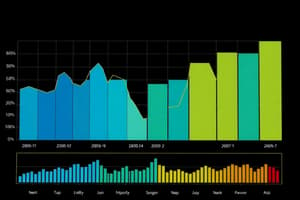Podcast
Questions and Answers
Which type of data scale is used for labeling variables without any quantitative value?
Which type of data scale is used for labeling variables without any quantitative value?
- Continous
- Ordinal
- Norminal (correct)
- Discrete
Which type of data scale emphasizes the order of values?
Which type of data scale emphasizes the order of values?
- Ordinal (correct)
- Continous
- Norminal
- Discrete
Which type of data represents distinct or separate data that relies on counts?
Which type of data represents distinct or separate data that relies on counts?
- Continous
- Discrete (correct)
- Norminal
- Ordinal
Which type of data represents an unbroken set of observations that can be measured on a scale?
Which type of data represents an unbroken set of observations that can be measured on a scale?
Which chart type is commonly used for visualizing comparisons of data in different categories?
Which chart type is commonly used for visualizing comparisons of data in different categories?
Which chart type is best for comparing average or percentages between 2 to 7 different groups?
Which chart type is best for comparing average or percentages between 2 to 7 different groups?
Which chart type is suitable for illustrating sample distributions on dimensions measured with discrete intervals?
Which chart type is suitable for illustrating sample distributions on dimensions measured with discrete intervals?
Which chart type is best for illustrating trends over time?
Which chart type is best for illustrating trends over time?
Which chart type is useful for examining the relationship or correlations between X and Y variables?
Which chart type is useful for examining the relationship or correlations between X and Y variables?
Which chart type is best used to illustrate the proportion within groups based on one variable?
Which chart type is best used to illustrate the proportion within groups based on one variable?
Which chart type is best for comparing average or percentages between 2 to 7 different groups?
Which chart type is best for comparing average or percentages between 2 to 7 different groups?
Which chart type is best for illustrating trends over time?
Which chart type is best for illustrating trends over time?
Which chart type is best for comparing average or percentages between 2 to 8 different groups with the x-axis mainly for mutually exclusive categories?
Which chart type is best for comparing average or percentages between 2 to 8 different groups with the x-axis mainly for mutually exclusive categories?
Which chart type is best used to illustrate the proportion within groups based on one variable and should only be used with a group of categories that combine to make a whole?
Which chart type is best used to illustrate the proportion within groups based on one variable and should only be used with a group of categories that combine to make a whole?
Which chart type is used to illustrate sample distributions on dimensions measured with discrete intervals?
Which chart type is used to illustrate sample distributions on dimensions measured with discrete intervals?
Flashcards are hidden until you start studying
Study Notes
Types of Data Scales
- Nominal Scale: Used for labeling variables without any quantitative value. Examples include gender, race, and hair color.
- Ordinal Scale: Emphasizes the order of values but does not indicate the degree of difference between them. Examples include rankings like first, second, and third.
- Discrete Data: Represents distinct or separate data that relies on counts. Examples include the number of students in a class or the number of cars in a parking lot.
- Continuous Data: Represents an unbroken set of observations that can be measured on a scale. Examples include height, weight, and temperature.
Types of Charts for Data Visualization
- Bar Chart: Commonly used for visualizing comparisons of data across different categories. Effective for displaying data that can be categorized easily.
- Column Chart: Best for comparing averages or percentages between 2 to 7 different groups. This chart uses vertical bars for presentation.
- Histogram: Suitable for illustrating sample distributions on dimensions measured with discrete intervals. Shows frequency distribution of data points.
- Line Chart: Best for illustrating trends over time. Ideal for time-series data to see changes at specific intervals.
- Scatter Plot: Useful for examining the relationship or correlations between X and Y variables. Highlights patterns or clusters in data.
- Pie Chart: Best used to illustrate the proportion within groups based on one variable. Best applied to categorical data that forms a whole.
- Grouped Bar Chart: Best for comparing averages or percentages between 2 to 8 different groups with x-axis mainly for mutually exclusive categories.
- Stacked Bar Chart: Ideal for illustrating the proportion within groups based on one variable. Should only be used with a group of categories that combine to make a whole.
- Box Plot: Used to illustrate sample distributions on dimensions measured with discrete intervals. Highlights medians, quartiles, and outliers in data.
Studying That Suits You
Use AI to generate personalized quizzes and flashcards to suit your learning preferences.


![[05/Rokel/12]](https://images.unsplash.com/photo-1454165804606-c3d57bc86b40?ixid=M3w0MjA4MDF8MHwxfHNlYXJjaHw0fHxmdW5uZWwlMjBjaGFydCUyMGRhdGElMjB2aXN1YWxpemF0aW9uJTIwc2FsZXMlMjBtYXJrZXRpbmd8ZW58MXwwfHx8MTcwNjQ4MDQwOHww&ixlib=rb-4.0.3&w=300&fit=crop&h=200&q=75&fm=webp)

